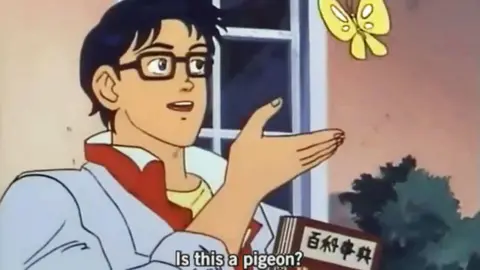Is this a pigeon? A 2011 meme reincarnated in 2018
 Sunrise
Sunrise2018 is becoming the year old memes come back to life.
When a 2011 meme called American Chopper re-emerged on Twitter in 2018, the BBC explored how a meme about two men arguing had lived a second life long after its first.
Now the feat has been repeated, as a 2011 image macro (a still picture with text imposed) asking if a butterfly is a pigeon has surged in popularity seven years later.
In the widely shared image, a character from a Japanese anime gestures towards a butterfly and asks: "Is this a pigeon?"
Allow X content?

Is this an old meme?
The image can be traced back to Indizi dell'avvenuta catastrofe on Tumblr, who posted it as an example of amusing subtitles in anime.
It was used in 2011 as a reaction image - posted to show confusion or suggest another person's opinion did not make sense.
Seven years after its original appearance online, the pigeon meme reappeared with text added to ask if "literally anything" was a "big mood" on Twitter.
A "big mood" is a Twitter term used to express approval or the fact a user agrees with or can identify with an item of tweeted content.
The image has since been liked over 100,000 times.
Allow X content?

Is this a new meme?
Hundreds, if not thousands, of variants of the image have subsequently appeared along with new captions.
Perhaps they have appeared because for some people on Twitter, the meme itself has become a "big mood".
For example, artist and writer Cat Gaffram used the meme to joke about people using Twitter to feel popular. Poet Jennifer Espinoza used the meme to ridicule people who overreact.
Even Netflix used the meme to lampoon some of its own television shows.
So, while the original 2011 meme was about reacting to confusing comments, the 2018 meme is about signposting content users can relate to.
And for some people, nothing is more relatable than Queen.
Allow X content?

Is this a translation mistake?
To answer that, you have to go back to the meme's origins.
The still was taken from an episode of a 1991 Japanese-language anime called The Brave Fighter of Sun Fighbird, set in the then-distant future of 2010.
In order for English-speaking fans to enjoy the episode, it needed to be translated. And with no organisation in place to perform this task, translation was provided by fans.
Kara Dennison, a writer and editor who now works professionally for anime distributor Crunchyroll, was one of the people who worked on the fan translation, or as anime fans call it the "fansub".
 Kara Dennison
Kara DennisonBut was it a mistake? Kara answers with an emphatic "No".
You might also like:
"That is 100% what the character is saying," she says. "He is an alien who is trying to get a hang of what Earth is.
"So he's just going outside, he sees something flying and assumes it's a pigeon. He's trying to catch on as quickly as possible."
So despite the image often featuring in lists of bad translations in subtitles, it is no mistake. And Kara says, for that reason, she cannot take credit for the meme.
"I don't know why it suddenly got famous now," she says. "Technically, the person who created it was the person who wrote the show.
"But even if I had a little hand in that and people are having fun with that, that's really cool."
Allow X content?

